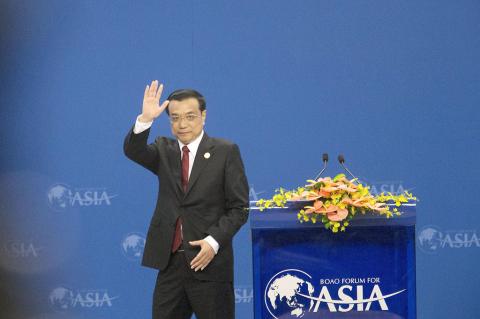China has announced plans to connect the stock exchanges of Hong Kong and Shanghai, allowing a combined 23.5 billion yuan (US$3.8 billion) of daily cross-border trading.
Investors will be able to trade 10.5 billion yuan of Hong Kong-listed stocks through the Shanghai exchange and 13 billion yuan of mainland China shares through Hong Kong, the China Securities Regulatory Commission said in a statement yesterday.
That is equivalent to about 21 percent of the average daily value of shares traded in Hong Kong over the past year, and 14 percent of daily trading on the Shanghai Composite Index, according to data compiled by Bloomberg.

Photo: Bloomberg
“The quota will have a significant impact on the Hong Kong market because it accounts for about a quarter or fifth of the daily turnover,” Delta Asia Securities Ltd strategist Sam Chi Yung (岑智勇) said.
“The quota amount is a starting point,” and may be increased, he said.
The aggregate quotas for the cross-border trading are 250 billion yuan for Hong Kong-listed stocks and 300 billion yuan for Shanghai shares, Hong Kong’s Securities and Futures Commission (SFC) said.
The limits may be adjusted in the future, and preparations for the link will take about six months, according to a statement from the regulator.
Connecting the exchanges will “further improve the opening and healthy development of capital markets in China and Hong Kong,” Chinese Premier Li Keqiang (李克強) said yesterday at the Boao Forum on China’s Hainan Island. Stocks with a primary listing in Shanghai have a market value of US$1.94 trillion, compared with US$3.56 trillion for Hong Kong, data compiled by Bloomberg showed.
Individual investors in mainland China need at least 500,000 yuan in their securities account to take part in the trading link, according to the SFC.
“This is good news for Hong Kong stocks,” Guotai Junan Securities Co (國泰君安證券) analyst Shirley Gu (古喬藝) said by telephone in Shenzhen. “It’s not about the quota now — the key is that the expectation is realized and this is now a certainty. This could attract new foreign investors and more active trading in Hong Kong.”
Mutual access would boost trading volumes and improve profitability for Hong Kong’s exchange, AMTD Financial Planning Ltd (尚乘財富) general manager Kenny Tang (鄧聲興) said.
It would also help the Shanghai market in the long run as foreign investors buy cheap shares, while mainland Chinese individuals would have the option to invest in Hong Kong stocks, Tang said.

The DBS Foundation yesterday announced the launch of two flagship programs, “Silver Motion” and “Happier Caregiver, Healthier Seniors,” in partnership with CCILU Ltd, Hondao Senior Citizens’ Welfare Foundation and the Garden of Hope Foundation to help Taiwan face the challenges of a rapidly aging population. The foundation said it would invest S$4.91 million (US$3.8 million) over three years to foster inclusion and resilience in an aging society. “Aging may bring challenges, but it also brings opportunities. With many Asian markets rapidly becoming super-aged, the DBS Foundation is working with a regional ecosystem of like-minded partners across the private, public and people sectors

BREAKTHROUGH TECH: Powertech expects its fan-out PLP system to become mainstream, saying it can offer three-times greater production throughput Chip packaging service provider Powertech Technology Inc (力成科技) plans to more than double its capital expenditures next year to more than NT$40 billion (US$1.31 billion) as demand for its new panel-level packaging (PLP) technology, primarily used in chips for artificial intelligence (AI) applications, has greatly exceeded what it can supply. A significant portion of the budget, about US$1 billion, would be earmarked for fan-out PLP technology, Powertech told investors yesterday. Its heavy investment in fan-out PLP technology over the past 10 years is expected to bear fruit in 2027 after the technology enters volume production, it said, adding that the tech would

YEAR-END BOOST: The holiday shopping season in the US and Europe, combined with rising demand for AI applications, is expected to drive exports to a new high, the NDC said Taiwan’s business climate monitor improved last month, transitioning from steady growth for the first time in five months, as robust global demand for artificial intelligence (AI) products and new iPhone shipments boosted exports and corporate sales, the National Development Council (NDC) said yesterday. The council uses a five-color system to measure the nation’s economic state, with “green” indicating steady growth, “red” suggesting a boom and “blue” reflecting a recession. “Yellow-red” and “yellow-blue” suggest a transition to a stronger or weaker condition. The total score of the monitor’s composite index rose to 35 points from a revised 31 in August, ending a four-month

RUN IT BACK: A succesful first project working with hyperscalers to design chips encouraged MediaTek to start a second project, aiming to hit stride in 2028 MediaTek Inc (聯發科), the world’s biggest smartphone chip supplier, yesterday said it is engaging a second hyperscaler to help design artificial intelligence (AI) accelerators used in data centers following a similar project expected to generate revenue streams soon. The first AI accelerator project is to bring in US$1 billion revenue next year and several billion US dollars more in 2027, MediaTek chief executive officer Rick Tsai (蔡力行) told a virtual investor conference yesterday. The second AI accelerator project is expected to contribute to revenue beginning in 2028, Tsai said. MediaTek yesterday raised its revenue forecast for the global AI accelerator used